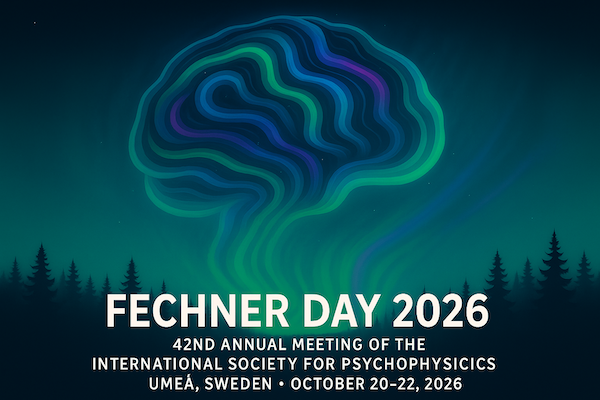Craig Leth-Steensen and Jordan Schoenherr Carleton University, Ottawa
Steven Carroll
St. Mary’s University, Halifax
William M. (“Bill”) Petrusic received a BA in psychology from the University of British Columbia in 1961, an MA in mathematics from the University of Michigan in 1963, and a PhD in psychology from the University of Michigan in 1968 (where he was supervised by Clyde Coombs). After a stint at the University of British Columbia, he joined the Psychology Department at Carleton University in Ottawa, Canada as a professor in 1970 (eventually becoming a Distinguished Researcher and Professor Emeritus in 2004) where he remained until his untimely passing. Bill was longstanding member of the International Society for Psychophysics and recently served as its Treasurer from 2006-2012.
Throughout his career, Bill had a profound influence on countless students and colleagues. Indeed, Bill was responsible for both introducing his students to real psychological science (i.e., psychophysics) and then encouraging them to become fully engaged in this great field. Undoubtedly, each one of the individuals that he mentored feels eternally grateful that they were able to cross paths with such a fountain of scientific knowledge (in Ottawa, Canada of all places). In dealing with and learning from Bill, one always felt directly connected to the rich history of both quantitative and empirical psychological inquiry (whether that be Thurstonian scaling or Münsterberg’s early study of reaction time).
Bill’s body of scientific work encompassed numerous key areas of research including the study of time-order error, symbolic comparison, memory psychophysics, confidence processing, the semantic congruity and spatial numerical association of response codes (SNARC) effects, as well as the psychophysical processes underlying judgement and decision making. Much of his work was dedicated to specifying basic psychological processes in mathematical terms. One enduring legacy of Bill’s will most certainly be that he can be regarded as champion of stochastic evidence-accrual modeling of decision making. Indeed, much of the work he performed over the last 25 years was dedicated to demonstrating that static models of responding in perceptual and cognitive choice tasks were invariably inferior to models which postulated a dynamic accumulation of information over time (such as his rather ingenious slow-and-fast-guessing counter model).
On a personal level, all would agree that Bill was an incredibly gracious and generous supervisor and friend whom others would go out of their way to spend time with. Dinners with him were to be looked forward to and remembered afterwards. Adventurous in life as well as science, Bill was always ready to go regardless of what kind of crazy endeavour was being cooked up for that evening. Apart from science, Bill loved music, wine, cooking, and his lovely and always supportive wife Elaine. Bill’s passing has left many of us with something missing in our lives that we will simply not be able to replace.
Jordan Schoenherr – Reflections on Bill Petrusic
Dr. Bill was a giant of a man both in stature and intellect. My first experience with Bill was as an undergraduate statistics student. His Bob Dylan quotes suggested to me someone with deep convictions and a wry sense of humour – someone that understood the pluralities of life. He showed this through kindness and decency toward each of his students, grappling with ethical questions and always endeavouring to do the right thing rather than what was convenient or conventional. I soon realized that Bill presented an exemplar that I could only hope to emulate imperfectly. Students, including myself, were the beneficiaries of his experience as he gave us the opportunity to try and fail without judgment or condescension, a method that emboldened each of us to be persistent in our pursuits. During my time with Bill as an undergraduate and Master’s student, I learned deeper lessons than research and experimental design. Through him, I came to know the virtues of academia and psychological science, something that is difficult to teach and even harder to learn. Given the probability of meeting someone like Bill, I am lucky for having had the chance to know him. He truly made a significant difference in my life.
Steven Carroll – Meeting Bill Petrusic
I have a lot of fond memories of Bill, and it is difficult to put into words the many ways that he has influenced both my personal and professional life. A student’s relationship with Bill did not end in his classrooms or in his lab. If Bill took you under his wing, it meant spending time socializing with him at conferences, in this home, and at the Pub. But with so many professional and social interactions to choose from, I would like to share the story of how I met Dr. Petrusic. I think that I learned just about everything that I needed to know about the man’s character during those first 15 minutes.
On September 11th, 2001, I was an undergraduate student, working full time and taking night classes at Carleton University. The news reports started rolling in from New York during my commute to work and, as I’m sure many of you will recall, the ceaseless flow of information grew more intense and more frightening as the day wore on. By the time I started making my way to school for my PSYC 3000 Advanced Statistics class, the ambient anxiety in Ottawa was palpable. Nobody knew who was responsible for the attacks. Nobody knew how the U.S. was going to react. The phrase “World War III” was being nervously passed around the classroom when I arrived. Absolutely everyone was certain that the class would be cancelled.
Into this atmosphere walked a Hawaiian-shirt clad, white-bearded, pony-tail sporting… well, if I’m being perfectly honest, “hippie” was the word that sprung to mind. We all quietly watched him settle in at the front of the classroom. The very first words spoken to me by Bill Petrusic were these: “I want you all to know that I am very aware of the day’s tragic events. I seriously considered cancelling class this evening. But, in the end, I decided that it was probably best for all of us if we just work through this together.” At this point he proceeded to administer an algebra test and informed us that we had 15 minutes to complete it before we moved on with the day’s lecture.
I don’t know how other people responded to his actions. I do know that by the end of the lecture I was feeling better, if a bit embarrassed that I’d forgotten how to divide one fraction by another. I also know that, from that day forward, EVERY time that I’ve been faced with any real stress or anxiety in my life, I’ve reached for a textbook and have tried to teach myself something
new. I’ve learned a lot from Bill, but I think the thing that I’ve learned best was the value of learning for learning’s sake.
I also know that I went on to do my Honours, Masters, and PhD work with Bill and that I pretty much decided to do so right after that first class. He was happy. He was generous. He was wise. He was a fantastic teacher. I miss him.


